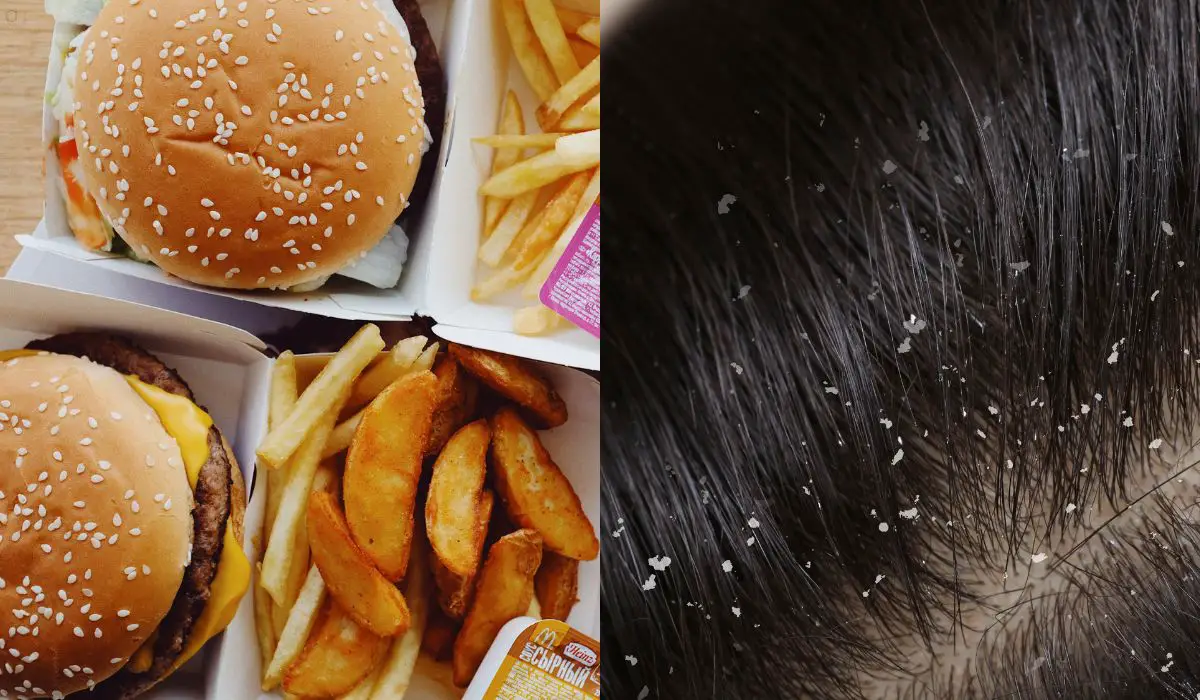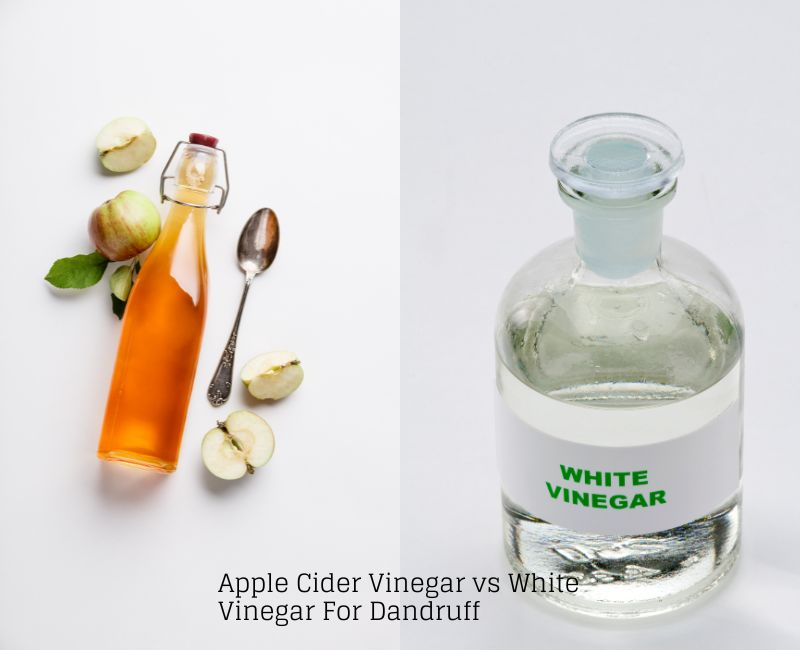Foods To Avoid Dandruff

Dealing with dandruff can be a real hassle, right?
It’s one of those things that creeps up when you least expect it, making you self-conscious and frustrated.
While we often reach for anti-dandruff shampoos or scalp treatments, the truth is, what we eat can play a big role in how our scalp behaves.
Some foods can actually make dandruff worse, while others help keep it under control.
Get 6 foods to avoid dandruff if you want to give your scalp some relief. Let’s take a look at how simple changes in your diet can help you keep the flakes in check.
6 Foods To Avoid Dandruff:
Dandruff is a common scalp condition that causes flakes, itching, and irritation, often leading to frustration and discomfort.
While many people turn to shampoos and topical treatments, it’s important to consider the role your diet plays in scalp health. Certain foods can contribute to dandruff by increasing inflammation, oil production, or fungal growth. In below. meet 6 foods to avoid dandruff and promote a healthy scalp.
1. Sugary Foods and Refined Sugars
Why You Should Avoid Them:
Consuming too much sugar can trigger inflammation in the body, which may worsen dandruff. Excess sugar also fuels the growth of yeast on your scalp, particularly a type of fungus called Malassezia, which is linked to dandruff. Additionally, eating sugary foods can cause spikes in insulin, disrupting the balance of oils on your scalp, leading to either excess oil or dryness, both of which contribute to flaking.
Examples to Avoid:
- Candies and chocolates
- Sugary beverages (soda, sweetened juices)
- Pastries, cakes, and donuts
- Ice cream and sugary desserts
Healthier Alternatives:
- Fresh fruits for natural sweetness
- Whole grains and complex carbohydrates
- Natural sweeteners like stevia or honey in moderation
2. Greasy and Fried Foods
Why You Should Avoid Them:
Greasy and deep-fried foods tend to be rich in unhealthy fats, which can overwhelm the scalp’s natural oil production. When your scalp produces too much oil, it can lead to clogged pores, inflammation, and the buildup of dead skin cells, all of which can increase dandruff. Eating too much fried food may also lead to excess sebum production, aggravating scalp conditions.
Examples to Avoid:
- Fried foods (fries, fried chicken, etc.)
- Deep-fried snacks (chips, fried doughnuts)
- Greasy pizza and heavy cheese-laden dishes
- Fried restaurant meals (fried seafood, deep-fried starters)
Healthier Alternatives:
- Grilled, roasted, or baked dishes
- Healthy fats from avocados, nuts, and olive oil
- Lean proteins such as grilled chicken or fish
3. Dairy Products
Why You Should Avoid Them:
Full-fat dairy can be inflammatory for some people, which may worsen dandruff by causing scalp irritation. The hormones found in dairy products, such as milk and cheese, can also trigger an increase in oil production on your scalp, making dandruff more likely. Some individuals may be intolerant or sensitive to dairy, leading to skin reactions, including dandruff.
Examples to Avoid:
- Whole milk and cream-based products
- Cheese (especially processed types)
- Butter and heavy creams
- Ice cream and milk-based sweets
Healthier Alternatives:
- Plant-based milk (almond, soy, oat)
- Dairy-free cheeses and yogurts
- Coconut milk or almond-based cream options
Read Next: Dandruff Treatment Dermatologist Recommended
4. Processed Foods and Junk Food
Why You Should Avoid Them:
Processed foods are often packed with preservatives, artificial additives, and excess salt, all of which can contribute to scalp issues. High sodium levels in processed foods can lead to dehydration, making your scalp dry and flaky. The preservatives and chemicals in packaged foods can also disrupt your body’s natural balance, leading to inflammation and weakened immune function, which can worsen dandruff.
Examples to Avoid:
- Packaged snacks (chips, crackers, candy bars)
- Instant meals and microwaveable foods
- Frozen dinners and processed meats (sausages, hot dogs)
- Fast food and sugary breakfast cereals
Healthier Alternatives:
- Whole, unprocessed foods like fruits, vegetables, and lean meats
- Homemade snacks such as roasted nuts or veggie sticks
- Whole-grain options instead of refined snacks
5. Alcohol
Why You Should Avoid It:
Alcohol is dehydrating and can strip moisture from your skin, including your scalp. A dry scalp is a common cause of dandruff, so drinking too much alcohol can exacerbate the issue. Alcoholic beverages also contain sugar, which can encourage the growth of yeast on your scalp, further worsening dandruff. In addition, alcohol disrupts the balance of essential fatty acids, which are important for maintaining a healthy scalp.
Examples of Alcoholic Drinks to Avoid:
- Beer (can increase yeast production)
- Sweet cocktails (margaritas, daiquiris)
- Wine (especially sweeter wines)
- Hard liquors (vodka, rum, whiskey)
Healthier Alternatives:
- Drink plenty of water to stay hydrated
- Herbal teas or non-sugary drinks
- Moderate alcohol consumption when necessary
6. Caffeine
Why You Should Avoid It:
Caffeine, commonly found in coffee, tea, and energy drinks, has a dehydrating effect on your body, including your scalp. A dry scalp can result in flaking and itching, both of which contribute to dandruff. Furthermore, excessive caffeine consumption can interfere with your hormone balance, leading to an overproduction of oil on your scalp and increasing the likelihood of dandruff.
Examples to Avoid:
- Coffee (especially in large quantities)
- Energy drinks with high caffeine content
- Soda and caffeinated soft drinks
- Some types of tea that are high in caffeine
Healthier Alternatives:
- Herbal teas like chamomile or peppermint
- Decaffeinated coffee or tea
- Coconut water and plenty of water for hydration
Note: Your diet plays a key role in managing dandruff. By avoiding or cutting down on foods such as sugary treats, greasy meals, dairy products, processed snacks, alcohol, and caffeine, you can help your scalp stay balanced and flake-free. Making these dietary changes, along with a consistent scalp care routine, can make a noticeable difference in dandruff management over time.
Remember, each person’s body reacts differently to food, so it’s important to observe how your scalp responds to these changes. But with patience and consistency, you can enjoy a healthier, more comfortable scalp.
Last Call:
- Dandruff is more than just a cosmetic issue—it can impact your comfort and confidence.
- While topical treatments are common, your diet also plays a significant role in managing dandruff. In this post, we explored the foods you should avoid to keep your scalp healthy and flake-free.
- Sugary foods, greasy and fried meals, dairy, processed snacks, alcohol, and caffeine can all trigger or worsen dandruff by causing inflammation, dehydration, or an imbalance in oil production.
If you want to tackle dandruff from the inside out, start by being mindful of your food choices. - Reducing processed, sugary, and greasy foods while incorporating whole, fresh ingredients can go a long way in promoting a healthier scalp.
Connect with Us:
- For more tips on scalp health, join our community on Pinterest and explore more helpful content to keep your hair looking its best.
- Feel free to pin your favorite tips and share them with others!
- By making small adjustments to your diet, you can keep dandruff at bay and enjoy a more confident, comfortable scalp every day.
FAqS | foods to avoid dandruff
Q. what not to eat to avoid dandruff?
To help prevent dandruff, avoid foods like sugary snacks, greasy fried dishes, dairy products, processed foods, alcohol, and caffeine. These foods can trigger scalp irritation, increase oil production, or promote yeast growth, all of which can worsen dandruff.
Q. why do i like eating dandruff?
Consuming too much sugar can increase inflammation and encourage the growth of yeast on your scalp, particularly a fungus called Malassezia. This can disrupt the balance of oils on your scalp, leading to more flakes and irritation.
Q. Can dairy contribute to dandruff?
Yes, dairy products—especially full-fat ones—can increase inflammation and oil production, which may worsen dandruff. Some people may also be sensitive to dairy, which can trigger scalp irritation and exacerbate dandruff symptoms.
Q. How do greasy and fried foods affect my scalp?
Greasy and fried foods are high in unhealthy fats, which can lead to an overproduction of oils on your scalp. Excess oil can clog pores, leading to flaking and irritation. These foods can also promote inflammation, making dandruff worse.
Q. Does alcohol cause dandruff?
Alcohol can dehydrate your body, including your scalp, making it more prone to dryness and flakes. It also disrupts your body’s oil balance, leading to increased oil production, which can contribute to dandruff. Additionally, alcohol contains sugar, which can fuel yeast growth on the scalp.
Q. Why do I feel the urge to eat dandruff?
The urge to eat dandruff is known as trichophagia, a condition linked to hair-pulling disorders like trichotillomania. It can be driven by stress, anxiety, or psychological triggers. If you experience this behavior, it’s important to seek advice from a healthcare professional for proper support and guidance.






